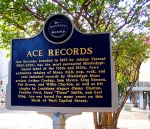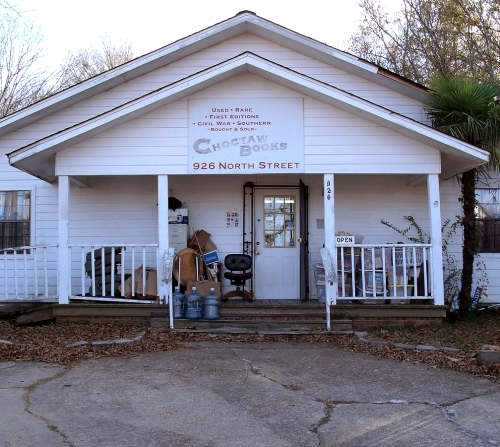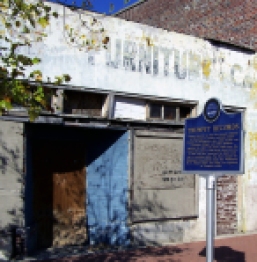Angel L
Choctaw Books
Saving Trumpet Records
309 Farish Street, the home of Trumpet Records, is a ruin.

The impact of Trumpet Records on American music has been profound and lasting, but the site of the studio is rapidly decaying. The building that housed this jewel in the crown of Mississippi music has not only lost its luster, but it’s become a dilapidated shell. While the roof and walls are intact, they’re barren and pitted, covered with patches of peeling paint and without windows, open to the erosive elements of weather.
Musician Sherman Lee Dillon is the driving force behind a group of people who seek to preserve and restore the building with an eye to commemorating Trumpet Records and its music. “What we’re trying to do is ensure that the old building where these legends laid down some the most famous tracks in Mississippi music is preserved. Maybe we can even to get some momentum going towards the restoration of Farish Street itself.”
Dillon notes that the 30-year efforts to restore the Farish Street District by massive infusions of public funding have stalled. “We think it’s worthwhile to give private initiative a chance.”
To that end, Dillon and his group have secured a lease on 309 North Farish Street, one of the few privately-owned properties in the Farish Street Historical District. Dillon said that he asked the owners not to lease or sell 309 Farish until he had an opportunity to restore it.

“They have stuck to their word for three years and not seriously entertained any other offers,” he said. “But I have not been able to find any pockets to get money from, and I am in not in a situation for matching funds. The city does nothing to support the project, even though the mayor drops by from time to time. I can’t wait any longer. If I can’t get the money to restore it, Trumpet Records goes on the block.”
Dillon said that once the building is secured, he will work on creating a nonprofit business, a museum and a recording studio. “I am personal friends with musicians who have played with several Mississippi blues people, Johnny Taylor, Milton, Bobby Rush, Dorothy Moore, BB King and Albert King.” Dillon points out that while Trumpet had some national recognition, their recordings of local celebrities might be one of the most interesting aspects of the proposed museum.

“The problem is that there’s no money for restoration,” Dillon said. “The agreement I have with the owners is for two years’ rent, $48,000, paid in advance within 30 days. That money will be used exclusively for the restoration of 309. Any money that comes from the operation of 309 for the next two years will be to further the services of the restoration.
“All I can say is that if this doesn’t work, a golden opportunity has been missed.”
Details available at Save Trumpet Records
Lion’s Manes
Two Heads Are Better
Paying Our Dues to the Blues
The blues have shaped American music for over a century, and many people the world over consider blues music Mississippi’s greatest contribution to global culture.
In recognition of this distinction, the state created the Mississippi Blues Commission (MBC) in 2005. Its original charter established a statewide Blues Trail, but it soon became clear that more was needed than just historical sites and signs. As Rep. Willie Bailey explains, “When the Blues Commission started putting up Trail markers across the state we discovered that many grassroots blues pioneers, artists and musicians were experiencing hardships due to misfortune and poverty.”

Dr. Edgar Smith, chairman of the Blues Benevolent Committee, said, “As a son of the Delta, I am keenly aware of the challenges that confront these artists on a daily basis. Many blues musicians, especially the older ones, have no health insurance and no other source of income other than what they get from blues gigs. It’s appropriate for Mississippi to have some mechanism for assisting the people from whom the blues derived. The Benevolence Fund represents the effort of on the part of the Mississippi Blues Commission to address this issue. I envision a future in which this effort will become the major focus of the MBC to the extent that it will approach the scale of the Music Maker Relief Foundation of Hillsborough, NC.”
The Music Maker Relief Foundation, founded in 1994, helps support elder blues and Appalachian artists. Their Musician Sustenance Program provides monthly stipends (typically $50 – $200), grants for emergencies and periodic needs for health care as well as other services. In 2012-13, Music Maker’s budget exceeded $630,000.
The Mississippi Blues Foundation, the fundraising arm of the MBC, spearheads efforts to secure money for the Blues Benevolent Committee’s separate grants fund. Most funds come from private donations, but the sale of car tags and donations from the annual Mississippi Blues Marathon also contribute to the fund. John Noblin, director of the marathon, said that the marathon is on the fast track to help.


Malcolm White, former director of the Mississippi Arts Commission, said, “The blues is based on hard times, and for many years the cultural and heritage movements in Mississippi have sought to honor these artists and support them when hard times come back around. Now that the Benevolent Committee has been established under Dr. Smith’s leadership and persistence, we have finally put our money where our mouths are.”
“Helping our native sons and daughters is the right thing to do,” Bailey said. “To come to the aid of suffering blues artists and musicians expresses Mississippi’s appreciation and recognition of their contributions to this native art form. We don’t want them standing on a corner with a cup begging, ‘Brother, can you spare a dime?’”
“People talk about keeping the blues alive,” Smith said, “but we need to keep these people alive, too.”
(For more information about the Mississippi Blues Benevolent Fund, contact Dr. Edgar Smith at: 601-713-2756)









